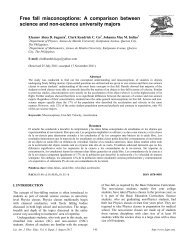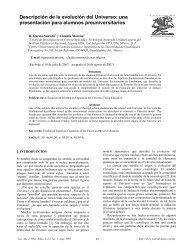Inquiry and active learning for the teaching of science at the ...
Inquiry and active learning for the teaching of science at the ...
Inquiry and active learning for the teaching of science at the ...
You also want an ePaper? Increase the reach of your titles
YUMPU automatically turns print PDFs into web optimized ePapers that Google loves.
<strong>Inquiry</strong> <strong>and</strong> <strong>active</strong> <strong>learning</strong> <strong>for</strong> <strong>the</strong> <strong>teaching</strong> <strong>of</strong><br />
<strong>science</strong> <strong>at</strong> <strong>the</strong> elementary school: A teacher<br />
training diploma course<br />
Ada T. Méndez Moreno<br />
Cic<strong>at</strong>a, IPN Legaria 694 Col. Irrigación, México 11500, D.F., México.<br />
The School District <strong>of</strong> Palm Beach County, Florida, EEUU.<br />
E-mail: lapizdos@yahoo.com<br />
(Received 9 August 2011, accepted 23 October 2011)<br />
Abstract<br />
Due to <strong>the</strong> need to provide elementary school teachers with effective instructional tools <strong>for</strong> <strong>the</strong> <strong>teaching</strong> <strong>of</strong> <strong>science</strong>, this<br />
paper proposes a diploma course th<strong>at</strong> would allow teachers to guide <strong>the</strong>ir students towards <strong>the</strong> use <strong>of</strong> enquiry as a tool<br />
to explore <strong>and</strong> <strong>active</strong>ly underst<strong>and</strong> <strong>the</strong> physical phenomena th<strong>at</strong> surround <strong>the</strong>m. This program is comprehensive <strong>and</strong><br />
integr<strong>at</strong>es concepts such as <strong>learning</strong> by inquiry, differenti<strong>at</strong>ed <strong>and</strong> project based instruction, <strong>and</strong> literacy <strong>for</strong> <strong>the</strong><br />
acquisition <strong>of</strong> scientific skills. In addition, identified technological resources such as simul<strong>at</strong>ors <strong>and</strong> adequ<strong>at</strong>e computer<br />
assisted <strong>science</strong> <strong>learning</strong> programs are experienced <strong>and</strong> analyzed by participants in <strong>the</strong> program. This diploma course<br />
intends to gener<strong>at</strong>e confidence <strong>and</strong> a different view <strong>and</strong> <strong>at</strong>titude towards <strong>the</strong> <strong>teaching</strong> <strong>of</strong> physics in <strong>the</strong> elementary<br />
school classroom.<br />
Keywords: Elementary school; Science Educ<strong>at</strong>ion; teacher training; technology in Physics Educ<strong>at</strong>ion; literacy <strong>for</strong><br />
physics <strong>teaching</strong>.<br />
Resumen<br />
Debido a la necesidad de proporcionar a los maestros de escuela primaria herramientas efectivas de instrucción para la<br />
enseñanza de la ciencia, este trabajo pone un diplomado que permitirá a los pr<strong>of</strong>esores a guiar a sus estudiantes hacia el<br />
uso de la investigación como una herramienta para explorar y entender activamente los fenómenos físicos que lo<br />
rodean. Este programa es exhaustivo e integra conceptos como el aprendizaje por investigación, diferenciada e<br />
instrucciones basadas en proyectos, y la instrucción para la adquisición de conocimientos científicos. Además,<br />
identifica los recursos tecnológicos, tales como simuladores y programas in<strong>for</strong>máticos adecuados asistidos para el<br />
aprendizaje de la ciencia, estos son experimentados y analizados por los participantes en el programa. Este diplomado<br />
tiene la intención de generar confianza y una visión diferente y la actitud hacia la enseñanza de la física en el aula de la<br />
escuela primaria.<br />
Palabras clave: Escuela primaria; Educación en Ciencias; capacitación docente; tecnología para la enseñanza de la<br />
Física; alfabetización y la enseñanza de la física<br />
PACS: 01.40.-d, 01.40.J-, 01.40.gb ISSN 1870-9095<br />
I. INTRODUCTION<br />
<strong>the</strong>y can, in a responsible manner, adopt adequ<strong>at</strong>e <strong>at</strong>titudes<br />
<strong>and</strong> make well founded decisions in order o resolve<br />
The lack <strong>of</strong> interest <strong>of</strong> students to elect scientific mayors everyday problems from a framework <strong>of</strong> respect <strong>for</strong> <strong>the</strong><br />
<strong>and</strong> pursue scientific careers has been a worldwide concern. o<strong>the</strong>rs, <strong>for</strong> <strong>the</strong> environment <strong>and</strong> <strong>for</strong> <strong>the</strong> future gener<strong>at</strong>ions.<br />
The didactic methods used in early schooling seem to have For th<strong>at</strong> reason, it is important to design <strong>science</strong> contents<br />
contributed to <strong>the</strong> discouragement <strong>of</strong> students to follow a th<strong>at</strong> integr<strong>at</strong>e life <strong>and</strong> citizenship in <strong>the</strong>ir outlines.<br />
scientific academic p<strong>at</strong>h because as soon as <strong>the</strong>y have <strong>the</strong><br />
To increase <strong>the</strong> number <strong>of</strong> students interested in<br />
possibility to choose out <strong>of</strong> a series <strong>of</strong> electives, <strong>the</strong>y stay scientific disciplines <strong>and</strong> to achieve <strong>the</strong> goals <strong>of</strong> <strong>science</strong><br />
away from physics or o<strong>the</strong>r <strong>science</strong> options. A gre<strong>at</strong> number educ<strong>at</strong>ion <strong>for</strong> life <strong>and</strong> citizenship, it is crucial to promote<br />
<strong>of</strong> students rejects or ab<strong>and</strong>ons <strong>science</strong> tracks <strong>at</strong> most upper <strong>and</strong> develop <strong>the</strong> interest <strong>and</strong> preference students have<br />
grade schools <strong>and</strong> <strong>science</strong> classes are extremely towards scientific subjects. At <strong>the</strong> elementary school <strong>the</strong>y<br />
unpopul<strong>at</strong>ed [1].<br />
have <strong>the</strong>ir fist encounters with scientific competencies <strong>and</strong><br />
The UNESCO [2] has st<strong>at</strong>ed th<strong>at</strong> <strong>the</strong> main goal <strong>for</strong> knowledge so it is <strong>the</strong>re where we need to start making our<br />
scientific educ<strong>at</strong>ion is to shape citizens th<strong>at</strong> can strive in a educ<strong>at</strong>ional ef<strong>for</strong>ts.<br />
world full <strong>of</strong> scientific <strong>and</strong> technological advancements so<br />
The problem <strong>of</strong> a weak scientific educ<strong>at</strong>ion comes from<br />
beyond <strong>the</strong> elementary school classroom, though. When a<br />
L<strong>at</strong>. Am. J. Phys. Educ. Vol. 6, Suppl. I, August 2012 340 http://www.lajpe.org
Ada T. Méndez Moreno<br />
person mayors in educ<strong>at</strong>ion, to become an elementary<br />
school teacher college <strong>and</strong> university curricula require <strong>and</strong><br />
<strong>of</strong>fer only a few (only two in many cases) courses <strong>for</strong> <strong>the</strong><br />
<strong>teaching</strong> <strong>of</strong> n<strong>at</strong>ural <strong>science</strong>s; only 8.2% <strong>of</strong> <strong>the</strong> requirements<br />
<strong>for</strong> gradu<strong>at</strong>ion <strong>at</strong> Mexican Universities [3]. It is not<br />
surprising to see how th<strong>at</strong> little importance is also given to<br />
<strong>science</strong> by practicing teachers who <strong>the</strong>mselves have had<br />
little training. Moreover, only three out <strong>of</strong> 22.5 instructional<br />
hours are <strong>for</strong>mally devoted to <strong>the</strong> <strong>teaching</strong> <strong>of</strong> scientific<br />
content <strong>at</strong> elementary schools in Mexico [4]. A few<br />
Bachelor <strong>of</strong> Educ<strong>at</strong>ion programs in countries such as<br />
Colombia <strong>and</strong> <strong>the</strong> United St<strong>at</strong>es <strong>of</strong> America <strong>of</strong>fer mayors<br />
th<strong>at</strong> focus on Science or Ecology educ<strong>at</strong>ion <strong>for</strong> elementary<br />
schools; however, <strong>the</strong>y do not have a strong dem<strong>and</strong> so<br />
fewer new programs with such fe<strong>at</strong>ures are being <strong>of</strong>fered.<br />
We believe th<strong>at</strong> an effective <strong>and</strong> viable way to develop<br />
<strong>science</strong> teacher competencies <strong>for</strong> <strong>the</strong> <strong>teaching</strong> <strong>of</strong> n<strong>at</strong>ural<br />
<strong>science</strong>s <strong>and</strong> <strong>of</strong> physics in particular <strong>at</strong> <strong>the</strong> elementary level<br />
is through specialized training in <strong>the</strong> <strong>for</strong>m <strong>of</strong> diploma<br />
courses th<strong>at</strong> once completed <strong>and</strong> linked toge<strong>the</strong>r may lead<br />
practicing teachers to complete a gradu<strong>at</strong>e degree.<br />
We also believe th<strong>at</strong> <strong>the</strong> scarce time <strong>and</strong> importance<br />
given to <strong>science</strong> <strong>at</strong> <strong>the</strong> elementary level is in many ways <strong>the</strong><br />
lack <strong>of</strong> awareness <strong>of</strong> effective ways <strong>and</strong> methods th<strong>at</strong><br />
integr<strong>at</strong>e contents so <strong>the</strong> time allotted to literacy or m<strong>at</strong>h<br />
can also review scientific content if managed properly<br />
without reducing <strong>the</strong> instructional time required <strong>for</strong> each<br />
subject m<strong>at</strong>ter by St<strong>at</strong>e st<strong>and</strong>ards.<br />
The contents <strong>of</strong> <strong>the</strong> diploma course we are presenting<br />
today aim <strong>at</strong> <strong>the</strong> development <strong>of</strong> <strong>teaching</strong> competencies th<strong>at</strong><br />
were not been <strong>for</strong>mally grown while teachers were <strong>at</strong> <strong>the</strong><br />
university. Teachers need to get pr<strong>of</strong>icient <strong>at</strong> planning,<br />
Teachers experience, use <strong>and</strong> analyze computer programs<br />
such as Discovery Educ<strong>at</strong>ion: Gizmos [9] (simul<strong>at</strong>ors);<br />
Brainpop: Science [10] (recre<strong>at</strong>ional lectures <strong>and</strong> follow up<br />
activities); Kidbizz3000 [11] (reading a differenti<strong>at</strong>ed levels<br />
<strong>of</strong> pr<strong>of</strong>iciency); <strong>and</strong> Enciclomedia [12] (simul<strong>at</strong>ions,<br />
recre<strong>at</strong>ional lectures <strong>and</strong> inter<strong>active</strong> instruction). On <strong>the</strong><br />
o<strong>the</strong>r h<strong>and</strong>, having experienced <strong>the</strong> programs initially,<br />
educ<strong>at</strong>ors may get a pro<strong>active</strong> <strong>at</strong>titude, analytical thinking<br />
<strong>and</strong> confidence to use <strong>the</strong> programs with heir students or<br />
propose <strong>the</strong> use <strong>of</strong> o<strong>the</strong>r technological resources <strong>and</strong><br />
innov<strong>at</strong>ive instructional str<strong>at</strong>egies.<br />
This Diploma program allows practicing teachers to<br />
obtain deeper knowledge <strong>of</strong> <strong>the</strong> physics topics dealt with in<br />
<strong>the</strong> elementary school programs grades 4 th trough 6 th <strong>and</strong> to<br />
acknowledge how <strong>the</strong>y correl<strong>at</strong>e with o<strong>the</strong>r areas <strong>and</strong><br />
disciplines <strong>and</strong> topics studied both within <strong>the</strong> same grade<br />
level <strong>and</strong> across <strong>the</strong> basic educ<strong>at</strong>ion curriculum. It intends<br />
to integr<strong>at</strong>e a baggage <strong>of</strong> didactic knowledge <strong>and</strong><br />
instructional practices th<strong>at</strong> go along with <strong>the</strong> most recent<br />
approaches <strong>for</strong> <strong>the</strong> <strong>teaching</strong> <strong>of</strong> <strong>the</strong> n<strong>at</strong>ural <strong>science</strong>s. Current<br />
curricular programs <strong>and</strong> adopted textbooks are revised <strong>for</strong><br />
teachers have a clear idea <strong>of</strong> wh<strong>at</strong> is taught <strong>at</strong> <strong>the</strong> grade<br />
level <strong>the</strong>y are in charge <strong>of</strong> <strong>and</strong> <strong>at</strong> <strong>the</strong> basic level as a whole.<br />
Additionally, contents are studied <strong>and</strong> rein<strong>for</strong>ced.<br />
Moreover, <strong>the</strong> practicing teachers plan <strong>and</strong> implement<br />
lessons th<strong>at</strong> include a variety <strong>of</strong> <strong>teaching</strong> <strong>and</strong> <strong>learning</strong><br />
str<strong>at</strong>egies th<strong>at</strong> highlight <strong>the</strong> importance <strong>of</strong> questioning <strong>and</strong><br />
inquiry , <strong>the</strong> solution <strong>of</strong> problems gener<strong>at</strong>ed by <strong>the</strong> students<br />
<strong>the</strong>mselves, collabor<strong>at</strong>ive <strong>and</strong> independent work <strong>and</strong> critical<br />
thinking. They design <strong>the</strong>ir lessons based on <strong>the</strong><br />
methodologies <strong>at</strong> study <strong>and</strong> can make a full implement<strong>at</strong>ion<br />
<strong>of</strong> <strong>the</strong>m.<br />
organizing <strong>and</strong> fully implementing inquiry <strong>and</strong> <strong>active</strong><br />
lessons <strong>and</strong> interactions in <strong>the</strong> classroom. The ultim<strong>at</strong>e<br />
intention is to motiv<strong>at</strong>e <strong>the</strong> intellectual curiosity in boys <strong>and</strong><br />
girls being taught so th<strong>at</strong> eventually-as students become<br />
actors in <strong>the</strong>ir own <strong>learning</strong> processes- <strong>the</strong>y learn to learn<br />
II. PERTINENCE OF CONTENTS, ORGANIZA-<br />
TION AND ARTICULATION<br />
<strong>and</strong> apply th<strong>at</strong> ability throughout <strong>the</strong>ir lives.<br />
Diverse Pedagogical <strong>and</strong> psychological <strong>the</strong>ories applied to<br />
It has been noted th<strong>at</strong> <strong>the</strong> average score in <strong>the</strong> n<strong>at</strong>ional <strong>the</strong> field have supported most current educ<strong>at</strong>ional programs.<br />
tests applied to aspiring teachers to obtain tenure in Mexico Constructivism is present in educ<strong>at</strong>ional research <strong>and</strong><br />
2009-2010 was <strong>of</strong> 64.48% in instructional competencies [5] <strong>teaching</strong> practice; however, <strong>the</strong>re is still a gap between<br />
so <strong>the</strong> opportunities to develop teachers’ competencies are educ<strong>at</strong>ional <strong>the</strong>ory <strong>and</strong> <strong>the</strong> practice <strong>of</strong> <strong>science</strong> educ<strong>at</strong>ion. It<br />
gre<strong>at</strong> along with <strong>the</strong> fact th<strong>at</strong> in <strong>the</strong> test PISA 2009, Mexico is <strong>the</strong> teacher who needs to be able to design instructional<br />
obtained uns<strong>at</strong>isfactory scores: 40% <strong>of</strong> <strong>the</strong> students in str<strong>at</strong>egies th<strong>at</strong> link curriculum, pedagogical <strong>the</strong>ories <strong>and</strong> <strong>the</strong><br />
reading <strong>and</strong> 47% in <strong>science</strong> which are st<strong>at</strong>istically actual practice th<strong>at</strong> takes place in <strong>the</strong>ir classroom. Teachers<br />
significant below <strong>the</strong> OECD average [6][7].<br />
need to be able to design <strong>and</strong> apply instructional str<strong>at</strong>egies<br />
This diploma course focuses on <strong>the</strong> development <strong>of</strong> th<strong>at</strong> are appropri<strong>at</strong>e <strong>for</strong> <strong>the</strong> subject m<strong>at</strong>ter <strong>and</strong><br />
teachers’ knowledge, abilities <strong>and</strong> competencies th<strong>at</strong> will simultaneously congruent with current educ<strong>at</strong>ional<br />
impact <strong>the</strong> acquisition <strong>of</strong> scientific competencies <strong>of</strong> <strong>the</strong>ir approaches. Elementary school teachers need to develop<br />
students through <strong>the</strong> integr<strong>at</strong>ion reading abilities, children competencies th<strong>at</strong> promote in <strong>the</strong>ir students abstract,<br />
liter<strong>at</strong>ure <strong>and</strong> computer programs as means <strong>for</strong> <strong>the</strong> complex <strong>and</strong> critical thinking. Recently, an array <strong>of</strong><br />
development <strong>of</strong> scientific abilities.<br />
instructional systems, techniques <strong>and</strong> methodologies have<br />
Based on specific goal number 12 <strong>of</strong> <strong>the</strong> educ<strong>at</strong>ional been proposed thanks to <strong>the</strong> fact th<strong>at</strong> <strong>science</strong> is no longer<br />
plan, 2021 written by <strong>the</strong> IEO [8] which dem<strong>and</strong>s <strong>the</strong> viewed as a subject m<strong>at</strong>ter to be dealt with by scientific<br />
improvement <strong>of</strong> quality educ<strong>at</strong>ion <strong>and</strong> school curricula th<strong>at</strong> communities or <strong>the</strong> intellectually privileged or experts, but<br />
includes literacy <strong>and</strong> <strong>the</strong> use <strong>of</strong> computers in <strong>the</strong> <strong>teaching</strong> common laymen. We are in need <strong>of</strong> promoting <strong>the</strong><br />
processes, <strong>the</strong> diploma course we are proposing includes enhancement <strong>of</strong> scientific abilities since <strong>the</strong> early childhood<br />
several technology components th<strong>at</strong> dem<strong>and</strong> <strong>the</strong> <strong>learning</strong> due to its importance both <strong>for</strong> life <strong>and</strong> work.<br />
<strong>and</strong> use <strong>of</strong> computer programs <strong>for</strong> <strong>the</strong> <strong>teaching</strong> <strong>of</strong> physics.<br />
L<strong>at</strong>. Am. J. Phys. Educ. Vol. 6, Suppl. I, August 2012 341 http://www.lajpe.org
The pedagogical approach th<strong>at</strong> sustains <strong>the</strong> diploma<br />
course here proposed is circumscribed by constructivist<br />
principles giving pivotal importance to <strong>the</strong> role <strong>of</strong> <strong>the</strong><br />
teacher proposed by Vigotsky in <strong>the</strong> development <strong>of</strong> <strong>the</strong><br />
proximal zone [13] <strong>and</strong> <strong>the</strong> identific<strong>at</strong>ion <strong>of</strong> background<br />
knowledge to tend a bridge th<strong>at</strong> links newly presented<br />
content as proposed by Ausubel [14].<br />
In order to let students inquire, question, propose,<br />
research, analyze <strong>and</strong> underst<strong>and</strong> <strong>the</strong> n<strong>at</strong>ural world th<strong>at</strong><br />
surround <strong>the</strong>m [15], underst<strong>and</strong>ing <strong>and</strong> practice <strong>of</strong> <strong>the</strong><br />
following programs are included: h<strong>and</strong>s on minds on<br />
activities; use <strong>of</strong> children liter<strong>at</strong>ure to gener<strong>at</strong>e <strong>and</strong> guide<br />
scientific inquiry (NASTA) [16]; differenti<strong>at</strong>ed instruction<br />
<strong>and</strong> <strong>learning</strong> styles (<strong>learning</strong> st<strong>at</strong>ions or centers) [17]; <strong>and</strong><br />
production <strong>of</strong> solutions on project based <strong>science</strong> instruction<br />
[18].<br />
III. AREAS OF STUDY<br />
<strong>Inquiry</strong> <strong>and</strong> <strong>active</strong> <strong>learning</strong> <strong>for</strong> <strong>the</strong> <strong>teaching</strong> <strong>of</strong> <strong>science</strong> <strong>at</strong> <strong>the</strong> elementary school: A teacher training diploma course<br />
‣ Collabor<strong>at</strong>ive work <strong>and</strong> <strong>learning</strong> to make collective<br />
decisions,<br />
‣ Use <strong>of</strong> liter<strong>at</strong>ure as a guide to <strong>for</strong>mul<strong>at</strong>e scientific<br />
enquiry in order to interpret <strong>and</strong> explain social, cultural<br />
<strong>and</strong> n<strong>at</strong>ural processes.<br />
‣ Responsible engagement in individual center work<br />
through differenti<strong>at</strong>ed activities showing respect <strong>and</strong><br />
appreci<strong>at</strong>ion <strong>of</strong> <strong>the</strong> diversity <strong>of</strong> capacities.<br />
‣ Ef<strong>for</strong>t to propose <strong>and</strong> implement scientific projects <strong>and</strong><br />
publish <strong>the</strong>m.<br />
The diploma course is divided into four modules each <strong>of</strong><br />
which includes:<br />
1. To make sure teachers deepen <strong>the</strong>ir subject m<strong>at</strong>ter<br />
knowledge <strong>and</strong> feel confident <strong>and</strong> com<strong>for</strong>table h<strong>and</strong>ling<br />
<strong>and</strong> <strong>teaching</strong> <strong>the</strong> topics, <strong>the</strong>y will review <strong>and</strong> analyze <strong>the</strong><br />
proposed sequence <strong>and</strong> complexity <strong>of</strong> <strong>the</strong> <strong>of</strong>ficial<br />
curricular maps <strong>and</strong> expect<strong>at</strong>ions <strong>for</strong> each grade level<br />
(from fourth through sixth grades).<br />
2. In order to favor reflective thinking <strong>and</strong> exp<strong>and</strong> <strong>the</strong>ir<br />
reasoning skills regarding <strong>the</strong>ir n<strong>at</strong>ural world <strong>of</strong> <strong>the</strong>ir<br />
students, teachers will revisit one instructional<br />
technique recently produced <strong>and</strong> successfully utilized in<br />
some parts <strong>of</strong> <strong>the</strong> world <strong>and</strong> will link it to one <strong>of</strong> <strong>the</strong><br />
topics <strong>of</strong> <strong>the</strong> content to teach to be able to design<br />
lessons th<strong>at</strong> take advantage <strong>of</strong> <strong>the</strong> technique introduced.<br />
3. With <strong>the</strong> intent to improve in <strong>the</strong> teachers <strong>the</strong>ir capacity<br />
to obtain, process <strong>and</strong> communic<strong>at</strong>e in<strong>for</strong>m<strong>at</strong>ion with<br />
<strong>the</strong> support <strong>of</strong> in<strong>for</strong>m<strong>at</strong>ion technology, in every module<br />
teachers will be exposed, learn about <strong>and</strong> analyze <strong>the</strong><br />
pertinence <strong>of</strong> a computer program designed <strong>for</strong> <strong>teaching</strong><br />
<strong>of</strong> <strong>science</strong> <strong>at</strong> an elementary level. Teachers will make<br />
recommend<strong>at</strong>ions <strong>for</strong> <strong>the</strong> use <strong>of</strong> such programs.<br />
IV. EXPECTED ACQUIRED COMPETENCIES<br />
V. CURRICULAR MAP<br />
Module A.- <strong>Inquiry</strong> Based Methodology<br />
Unit I. Science Educ<strong>at</strong>ion in <strong>the</strong> recent history<br />
Unit II. <strong>Inquiry</strong> in <strong>the</strong> <strong>science</strong> lesson<br />
Unit III. Technology component: Gizmos<br />
Unit IV. Content study: Energy<br />
Module B.-<br />
Literacy <strong>and</strong> <strong>the</strong><br />
<strong>teaching</strong> <strong>of</strong><br />
<strong>science</strong>.<br />
Unit V.<br />
Instructional model<br />
<strong>of</strong> <strong>the</strong> 5Es.<br />
Unit VI. Didactic<br />
use <strong>of</strong> comic strips,<br />
magazines <strong>and</strong><br />
liter<strong>at</strong>ure.<br />
Unit VII.<br />
Technology<br />
component:<br />
Kidbizz3000.<br />
Unit VIII. Content<br />
study: M<strong>at</strong>erials.<br />
VI. CONCLUSION<br />
Module C.-<br />
Differenti<strong>at</strong>ed<br />
Instruction<br />
Unit IX. Individual<br />
differences in<br />
pedagogy.<br />
Unit X. Learning<br />
Styles.<br />
Unit XI.<br />
Technology<br />
component: Brain<br />
Pop<br />
Unit XII. Content<br />
study: Change.<br />
Module D.-<br />
Project based<br />
<strong>learning</strong><br />
Unit XIII. Project<br />
based instruction.<br />
Unit XIV. Research<br />
based Pedagogy.<br />
Unit XV. Science<br />
Fair: Young<br />
Scientists.<br />
Unit XVI<br />
Technology<br />
component:<br />
Enciclomedia.<br />
This diploma course is ambitious <strong>and</strong> will certainly dem<strong>and</strong><br />
time <strong>and</strong> ef<strong>for</strong>t from participants; however, <strong>the</strong> n<strong>at</strong>ure <strong>of</strong> its<br />
contents, <strong>the</strong> innov<strong>at</strong>ive character <strong>of</strong> <strong>the</strong> methodologies, <strong>and</strong><br />
<strong>the</strong> variety <strong>of</strong>fered make it <strong>at</strong>tr<strong>active</strong> <strong>for</strong> those teachers th<strong>at</strong><br />
have scientific interests <strong>and</strong> <strong>the</strong> will to make <strong>the</strong>ir students<br />
succeed academically <strong>and</strong> in life.<br />
It is intended th<strong>at</strong> once <strong>the</strong> teachers finish <strong>the</strong> course, <strong>the</strong>y<br />
will:<br />
Feel confident <strong>and</strong> knowledgeable when <strong>teaching</strong> topics<br />
<strong>of</strong> physics studied <strong>at</strong> <strong>the</strong> elementary level.<br />
Be capable to <strong>of</strong>fer quality lessons by integr<strong>at</strong>ing<br />
<strong>learning</strong> activities th<strong>at</strong> link current didactic proposals<br />
with <strong>the</strong>ir students’ needs <strong>and</strong> <strong>the</strong> curriculum in order to<br />
enhance scientific competencies in <strong>the</strong>ir students.<br />
Use <strong>and</strong> make evident <strong>the</strong> importance <strong>of</strong> in<strong>for</strong>m<strong>at</strong>ion<br />
technology as a means <strong>for</strong> <strong>the</strong> <strong>learning</strong> <strong>of</strong> physics.<br />
Be able o design lessons th<strong>at</strong> promote students’…<br />
‣ <strong>Inquiry</strong> <strong>and</strong> search <strong>for</strong> solutions <strong>of</strong> posed questions.<br />
REFERENCES<br />
[1] Fernández-González, M., Ciencias para el mundo<br />
contemporáneo. Algunas reflexiones didácticas, En Eureka<br />
Enseñanza Divulgación y Ciencia 5, 185-199 (2008).<br />
[2] UNESCO, Habilidades para la vida. Contribución<br />
desde la educación científica en el marco de la Década de<br />
la Educación para el Desarrollo Sostenible, Congreso<br />
Internacional de Didáctica de las Ciencias, La Habana:<br />
author, p. 24 (2006).<br />
[3] SEP (2002). Plan de estudios 1997. Licenci<strong>at</strong>ura en<br />
Educación Primaria. Programa para la Trans<strong>for</strong>mación y el<br />
L<strong>at</strong>. Am. J. Phys. Educ. Vol. 6, Suppl. I, August 2012 342 http://www.lajpe.org
Ada T. Méndez Moreno<br />
Fortalecimiento Académicos de las Escuelas Normales,<br />
(México D.F.).<br />
[4] SEP. Plan de Estudios 2009. Educación Básica<br />
Primaria, 2ª Ed. (Comisión Nacional de Libros de Texto<br />
Gr<strong>at</strong>uitos, México D.F., 2009).<br />
[5] SEP. Concurso Nacional de Asignación de Plazas<br />
Docentes 2009-2010. Estadísticas de resultados del examen.<br />
Retrieved 16 March (2011) from:<br />
http://201.175.42.249/conapdre09/reportes/wf00rptResultad<br />
os_CompetenciasEvaluadas_NivelEduc<strong>at</strong>ivoLabora.aspx<br />
[6] SEP. México en PISA 2009: Resumen Ejecutivo.<br />
Retrieved 14 March,<br />
http://www.sep.gob.mx/work/models/sep1/Resource/1073/1<br />
/images/PISA_2009-RESUMEN_EJECUTIVO.pdf<br />
[7] OECD. PISA 2009 Results: Wh<strong>at</strong> Students Know <strong>and</strong><br />
can Do: Student Per<strong>for</strong>mance in Reading, Ma<strong>the</strong>m<strong>at</strong>ics <strong>and</strong><br />
Science, Volume 1, p.152 (2010)<br />
http://www.oecd.org/d<strong>at</strong>aoecd/54/12/46643496.pdf<br />
[8] Organización de Estados Iberoamericanos para la<br />
Educación, la Ciencia y la Cultura, 2021 Metas educ<strong>at</strong>ivas.<br />
La educación que queremos para la generación de los<br />
bicentenarios. OEI, Madrid (2010), pp. 152.<br />
[9] http://www.explore<strong>learning</strong>.com/ Visited 20 March<br />
(2011).<br />
[10] http://esp.brainpop.com/ Visited 22 March, 2011 [11]<br />
www.Kidbiz300.com Visited 24 March (2011).<br />
[12] www.enciclomedia.edu.mx visited 20 March, 2011<br />
[13] Vigotsky, L., Pensamiento y lenguaje, (Ediciones<br />
Fausto, Buenos Aires, 1995).<br />
[14] Ausubel, D. P., Adquisición y retención del<br />
conocimiento. Una perspectiva cognitiva, (Ed. Paidós,<br />
Mexico, D.F., 2002).<br />
[15] Olson, S. <strong>and</strong> Loucks-Horsley, S., La indagación en la<br />
ciencia y en las aulas de clase, In <strong>Inquiry</strong> <strong>and</strong> <strong>the</strong> N<strong>at</strong>ional<br />
Science Educ<strong>at</strong>ion St<strong>and</strong>ards, A Guide <strong>for</strong> Teaching <strong>and</strong><br />
Learning. Center <strong>for</strong> Science, Ma<strong>the</strong>m<strong>at</strong>ics, <strong>and</strong><br />
Engineering Educ<strong>at</strong>ion, (N<strong>at</strong>ional Academy Press.,<br />
Washington D.C., 2004), (Original paper published in<br />
2000).<br />
[16] Ansberry, K. <strong>and</strong> Morgan, E., More Picture-Perfect<br />
Science Lessons, Using Children’s Books to Guide <strong>Inquiry</strong>.<br />
Arlington, Virginia: NSTApress (2007).<br />
[17] Lopez, E. y Touron, J.,Hacia una pedagogía de las<br />
diferencia individuales: reflexiones en torno al concepto de<br />
pedagogía diferencial, in Revista Complutense de<br />
Educación 2, 83-92 (1991). Edit. Univ. Complutense,<br />
Madrid (1991).<br />
[18] Mejía, J. <strong>and</strong> Manjarrés, M., Las pedagogías fundadas<br />
en la investigación, Búsquedas en la reconfiguración de la<br />
educación (2010).<br />
http://www.eduteka.org/PedagogiasInvestigacion.php<br />
Visited 25 March, 2011<br />
L<strong>at</strong>. Am. J. Phys. Educ. Vol. 6, Suppl. I, August 2012 343 http://www.lajpe.org


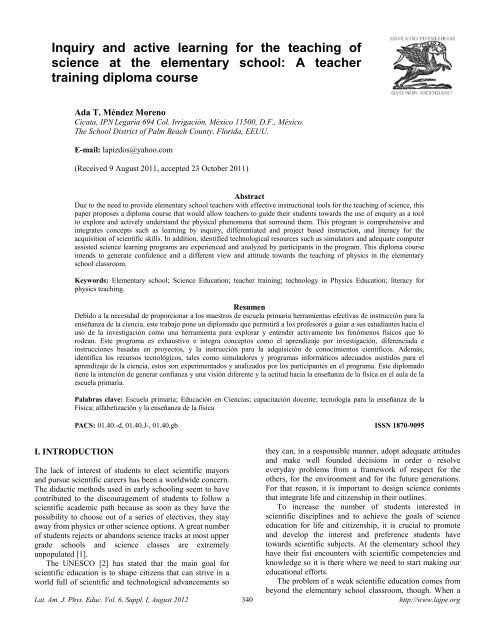
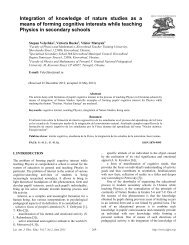
![Diversas formas de visualizar estados en un sistema cuántico [PDF]](https://img.yumpu.com/51151303/1/190x245/diversas-formas-de-visualizar-estados-en-un-sistema-cuantico-pdf.jpg?quality=85)
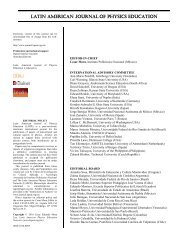
![Precession and nutation visualized [PDF]](https://img.yumpu.com/50786044/1/190x245/precession-and-nutation-visualized-pdf.jpg?quality=85)
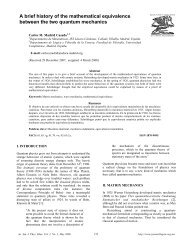
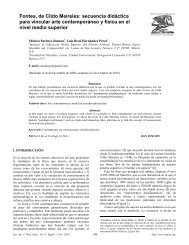
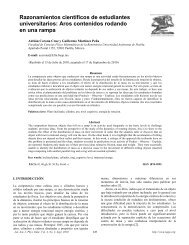
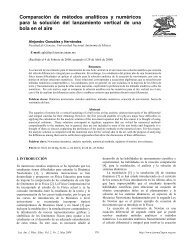
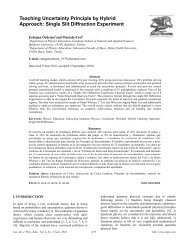
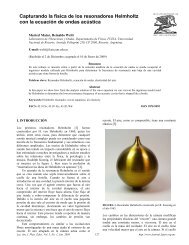
![Index [PDF] - Latin-American Journal of Physics Education](https://img.yumpu.com/47984121/1/190x245/index-pdf-latin-american-journal-of-physics-education.jpg?quality=85)
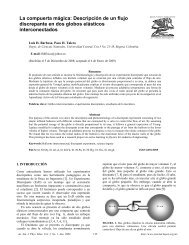
![Flujo de agua en botellas como experimento didáctico [PDF]](https://img.yumpu.com/43536300/1/190x245/flujo-de-agua-en-botellas-como-experimento-didactico-pdf.jpg?quality=85)
